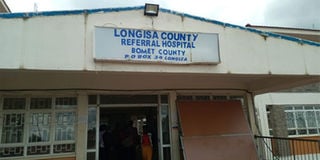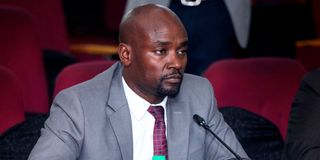
Longisa County Referral Hospital in Bomet County.
An audit report has exposed a paradox of Longisa County Referral Hospital grappling with acute drug shortage despite having expired medical supplies worth millions in its stores.
The report by Auditor-General Nancy Gathungu revealed that the hospital is holding expired drugs mixed with unexpired ones yet patients are referred to nearby chemists.
Further, the report for the financial year ending June 2024 laid bare the sorry state of the facility as it does not even have a general surgeon.
According to the report, the Level Four Hospital is grappling with service delivery gaps, expired medical supplies, shortage of critical equipment and understaffing in critical departments.
The damning revelations emerged during a Senate County Public Investments and Special Funds Committee on Friday last week.
The report noted there are 85 units of expired drugs of undetermined value, including intraocular lens and AVF sets which had not been disposed of, together with some units which were still stored with the unexpired drugs in the stores.
Further, the hospital is holding expired drugs of unknown value which are mixed with unexpired ones, making it difficult to determine which are dispensed to patients.
Exacerbating matters, the auditor told the committee chaired by Vihiga Senator Godfrey Osotsi that the expired drugs are still at the hospital, several months after auditors flagged the matter.
Appearing before the committee, Governor Hillary Barchok was at pains to explain why the hospital is holding onto expired medical supplies despite complaints from residents over drug shortage at the hospital.

Bomet Governor Hillary Barchok.
“This is a serious concern. Longisa is not a small facility. A good number of people in the South Rift depend on the facility. How many people in Bomet are dispensed with the expired drugs?” posed Bomet Senator Hillary Sigei.
The lawmaker hard-pressed the county boss to explain what steps the hospital has taken to ensure lives of people in Bomet are not at risk because of the expired drugs.
Senator Osotsi questioned the governor why the hospital has failed to dispense medical supplies in accordance with the first expiry, first out principle or application of first in, first out principle.
“How do drugs expire in the hospitals? I think it is not about systems but something else. What is the real story? I think there is a deeper problem because if you observe the chemists around the hospitals are doing well,” said Mr Osotsi.
"I see in some counties governors launching drug supply but a week later, residents complain of a drug shortage. This issue of expired drugs must be investigated," he added.
Admitting the existence of expired drugs in the facility, Governor Barchok said they are committed to addressing the issue by developing a disposal plan and have already put in place a system to monitor the flow of drugs and notify when they are nearing expiry.
“I admit we have a bigger problem because we cannot be accused of expired drugs and no drugs at the same time. Patients say they are prescribed drugs but they don’t get them at the pharmacy but when I call, the drugs suddenly appear,” he said.
However, the report revealed there is no evidence of a system that integrates stores, pharmacy and other critical departments despite the facility saying it has an inventory management system guiding the issuance of pharmaceutical and non-pharmaceutical supplies.
Tip of the iceberg
The issue of the expired drugs is just a tip of the iceberg as the hospital does not have enough radiologists and has no general surgeon against a requirement of at least two each.
This is against the requirements of the Kenya Quality Model for Health Policy guidelines which prescribes that such a hospital should have at least two radiologists and general surgeons.
Further exposing service delivery gaps at the facility, there were shortages in New Born Unit cots, functional Intensive Care Unit beds and HDU beds.
However, the governor said the county government has approved three medical doctors to undergo postgraduate training in radiology and the hospital has just received a surgeon who had completed training.
But the rot did not end there as the report flagged understaffing in critical areas at the hospital as well as irregular engagement and payment of casual employees.
According to the report, the hospital engaged casuals for 12 months consecutively without a review of their terms contrary to the law that states that the casuals should not be engaged consecutively for more than three months.
Interestingly, Governor Barchok said the casuals were engaged on a need basis but renewed for a cumulative period of 12 months since they had been trained on the specialised handling of hospital equipment and as per hygiene requirements for the hospital.
Nonetheless, the auditor revealed that the management did not provide approved staff establishment showing deficiency of staff to be filled, formal requests by the departmental heads and approval of the hospital’s Board at the time of audit for review.
Senator Osotsi pressed the governor to explain why they did not provide staff establishment and contract letters at the time of the audit exercise.
“Why did the Management renew the contracts after 12 months instead of the required three months?” he posed.









